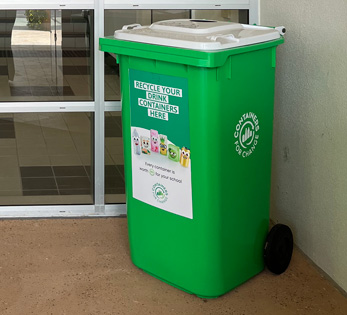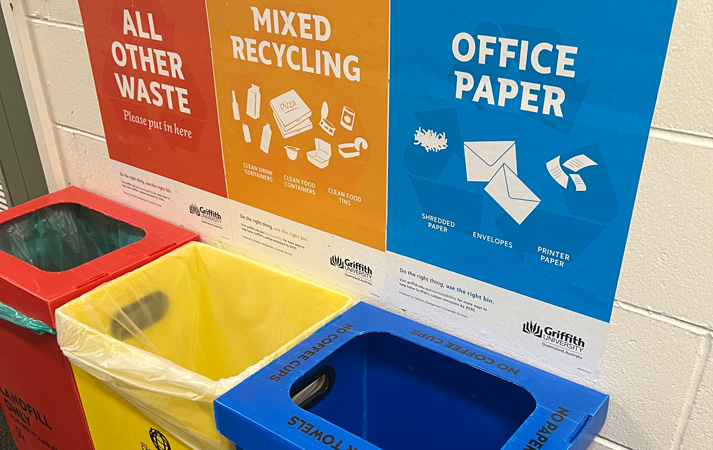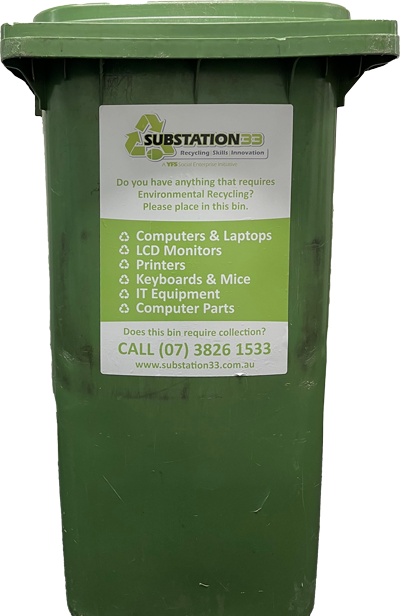Towards a low-waste and circular economy campus
As part of Griffith University’s commitment to sustainability, the University is seeking to make practical and measurable improvements to our current waste management practices across each campus. This is supported by the Sustainability Strategy, which details Griffith’s goals leading up to 2030 in working towards a circular economy and low-waste campuses.
By 2030, Griffith will improve waste monitoring systems across the generated waste streams on campuses and analyse waste management performance. Additionally, alongside waste contractors, Griffith will identify opportunities to improve performance in accordance with the waste hierarchy. Griffith is also eliminating single-use plastics from campus operations aligning with the state government roadmap and through our procurement processes, reduce consumption where possible by prioritising products that have been repurposed or products that can be reused or recycled at the end of asset life.
Minimising waste and diverting it from landfills (through recycling) remains a crucial priority, with growing focus on reducing plastic use, designing products and packaging with their life cycles in mind, and repurposing materials for higher-value applications, aligning with the principles of the circular economy. The Queensland Government Single-Use Plastics Ban lists specific items which are banned from the state of Queensland, including straws and stirrers, plates, plastic bowls, and cutlery, expanded polystyrene (EPS) takeaway food containers and EPS cups, and more.
As per our policies, plans and strategies below, the University adheres to the single-use plastics ban. The University is committed to sustainable practices and encourages the minimisation of all waste on campus, in particular plastic.
Sustainable Development Goals
Griffith University is aligned to the United Nation's Sustainable Development Goals (SDGs) and is committed to combatting climate change and contributing to a more sustainable world, where resources are used efficiently, waste is minimised, and sustainable practices are implemented while fostering partnerships for the goals.
2030 targets
Key targets for 2030 include:
- annual waste to landfill (average per full-time equivalent staff and students from all sources) at Griffith University will be less than 30kg
- recycling diversion as a proportion of all waste will be greater than 25%.
- From 2024, organic waste on campus will be processed on campus to produce compost.
- All campuses will have zero single-use plastic across our food outlets, catering and non-medical consumables.
Policies on plastic waste reduction
To support our 2030 waste targets, Griffith University has several policies to reduce waste, and in particular the minimisation of plastic waste and disposable items, on campus that extend to outsourced services, suppliers and the supply chain:
Environmental Sustainability Policy
Our Environmental Sustainability Policy (updated 2023, replacing our Sustainability Policy) states the University will avoid and minimise waste generated on campus, including the minimisation of plastic waste and disposable items, by implementing the principles of the waste hierarchy, circular economy and responsible consumption and production, an explicitly recognises the need to addresses the reduction of plastic waste on campus. All staff and students conducting university activities, and suppliers, visitors and contractors when on-campus are responsible for ensuring compliance with their environmental obligations under this policy.
Supplier Code of Conduct
Our Supplier Code of Conduct (created 2022; updated 2023; 2024) states that all suppliers must comply with Queensland Government single use plastics ban and have in place policies, procedures and practices to avoid or reduce waste, including the minimisation of plastic waste and use of plastic (especially single-use plastic) and disposable items.
Procurement and Supply Policy
Our Procurement and Supply Policy (created 2022; updated 2023; 2024) prioritises purchases that minimise waste, including the minimisation of plastic waste, and reduce the use of plastic (especially single-use plastic by promoting products that can be reused) and disposable items. This policy applies to all staff, University appointees, its controlled entities, and to all procurement and supply activities authorised and conducted by or on behalf of the University.
Chemicals Procedure
Our Handling, Using and Disposing of Chemicals Procedure (which was in place by 2023 and updated 2023) outlines the requirements for safe and effective management of handling, use and disposal of chemicals at Griffith University. The procedure seeks to ensure environmental responsible management of chemicals and aims to minimise risks to personnel and property, while ensuring continuing legislative compliance. This procedure applies to all staff, students, contractors and other relevant persons engaged by Griffith University that procure, use, store and dispose of chemicals as part of their work, research or study.
Reducing waste: Key initiatives
The aim of our actions is to engage the entire University community in achieving our resource recovery and waste minimisation objectives. At Griffith, we have adopted a comprehensive approach to reducing waste, including plastic waste, through various strategies such as:
Developing policies and procedures
Installing standardised infrastructure, like signage and bins
Providing accessible and inclusive communications for the University community
Educating the campus on proper sorting of materials, waste reduction, and reuse practices
Reusing, repairing, and recirculating usable materials
Improving the procurement process to minimise waste
Collaborating with campus partners and affiliates to work towards zero waste to landfill
Standardising and institutionalising zero waste practices and behaviours
Significant changes in waste management strategies have been introduced over the past two years. In 2023, for example, a number of initiatives were introduced:
- Containers for Change recycling scheme implemented - Through the introduction of Containers for Change bins across campuses, Griffith University staff and students have a new way to help the environment and students thanks to a new partnership. Upon collection of eligible drink containers placed in the Containers for Change bins, all 10-cent refunds from will be donated to Griffith’s Brighter Futures Scholarships which assists financially disadvantaged and educationally disadvantaged students.
- Organic waste collection from food tenancies in operation - The by-product of this waste collection- compost- is then used within campus landscaping operations.
- Takeaway cup surcharge implemented - To increase the use of reusable cups and reduce general waste, a surcharge was implemented. This has resulted in a 400% increase in sales using reusable cups with Cafe Rossa alone having an additional 23,625 sales using reusable cups compared to their 2022 sales.
- Herb gardens created at Logan Campus - To utilise organic waste from cafes, where collection is currently not possible, a herb garden has been created at Logan Campus.
In October 2024, the new waste management contractor commenced operations. Our new contractor is committed to sustainability and the Sustainable Development Goals (SDGs). They will regularly provide precise data regarding both recycled (co-mingled) waste and landfill (general) waste, ensuring transparency and accountability in their practices. Small-scale Material Recovery Facility (MRF) has been established at Nathan campus and one will be established at Gold Coast campus soon. General waste and co-mingled recycling are collected by cleaning staff on campus and transported to the MRFs where it is deposited in the correct large compactor bins. In the future, Griffith seeks to establish a sorting station where the co-mingled waste can be sorted. The large compactors in the MRFs are collected by the waste contractor.
In 2024, a Waste Management Working Group was established to coordinate actions between Campus Life, Griffith Sustainability, the incoming waste provider and ISS Facility Cleaning Services.
Reducing plastic waste: Our action plan (2023 to 2030)
Plastic waste and microplastics entering the fresh and marine aquatic environment are a major environmental and social challenge. Alongside leading research on microplastics within aquatic and marine environments, our plastic reduction initiatives include:
- removal of plastic cutlery, utensils and straws from campus service providers and catering
- a Sustainable Events Guide to support the reduction of single-use plastic at Griffith events and graduation ceremonies
- KeepCup and bring-your-own-water-bottle campaigns to encourage reuse and limit the sale of single-use plastic drink containers
- water fountains and refill stations to encourage the use of reusable containers and ensure access to clean drinking water for all
- development of waste management initiatives to avoid and limit plastic waste as Griffith strives to become a zero-plastic university
- removal of single use plastics amongst food tenants; instead now using reusable/recyclable packaging.
Reducing waste: Our performance
Contact Griffith Sustainability
Griffith Sustainability Room 2.40, Building N54, Griffith University, 170 Kessels Road, Nathan QLD, 4111


